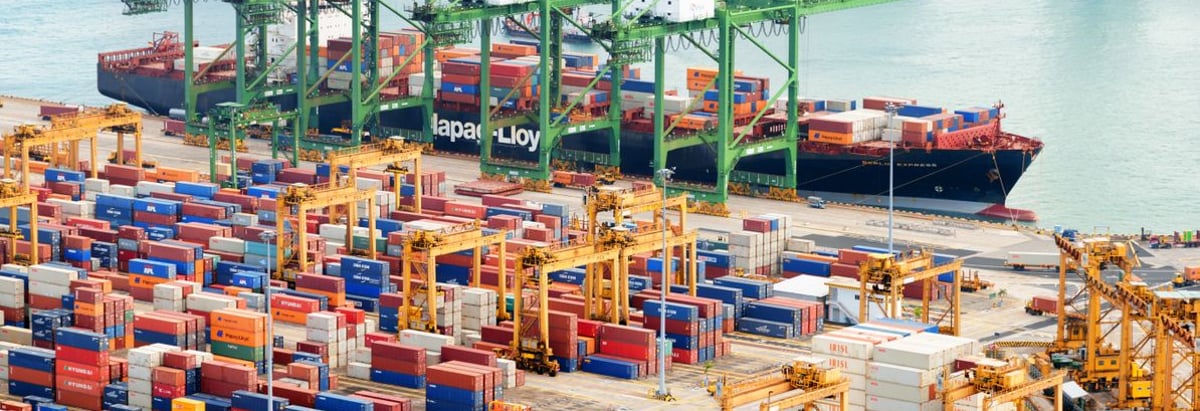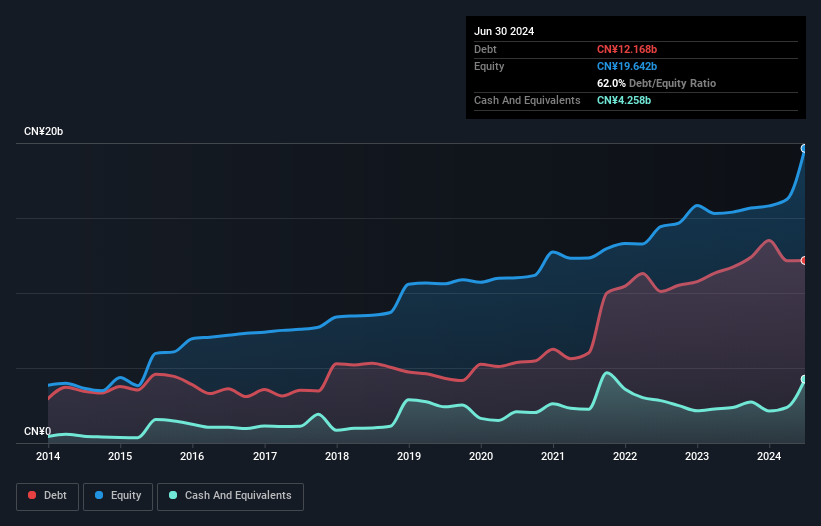- China
- /
- Infrastructure
- /
- SZSE:000582
We Think Beibu Gulf Port (SZSE:000582) Is Taking Some Risk With Its Debt

Howard Marks put it nicely when he said that, rather than worrying about share price volatility, 'The possibility of permanent loss is the risk I worry about... and every practical investor I know worries about.' So it seems the smart money knows that debt - which is usually involved in bankruptcies - is a very important factor, when you assess how risky a company is. We note that Beibu Gulf Port Co., Ltd. (SZSE:000582) does have debt on its balance sheet. But the more important question is: how much risk is that debt creating?
When Is Debt A Problem?
Debt is a tool to help businesses grow, but if a business is incapable of paying off its lenders, then it exists at their mercy. In the worst case scenario, a company can go bankrupt if it cannot pay its creditors. However, a more usual (but still expensive) situation is where a company must dilute shareholders at a cheap share price simply to get debt under control. Of course, plenty of companies use debt to fund growth, without any negative consequences. The first step when considering a company's debt levels is to consider its cash and debt together.
See our latest analysis for Beibu Gulf Port
How Much Debt Does Beibu Gulf Port Carry?
As you can see below, Beibu Gulf Port had CN¥12.2b of debt, at June 2024, which is about the same as the year before. You can click the chart for greater detail. On the flip side, it has CN¥4.26b in cash leading to net debt of about CN¥7.91b.

How Strong Is Beibu Gulf Port's Balance Sheet?
According to the last reported balance sheet, Beibu Gulf Port had liabilities of CN¥6.12b due within 12 months, and liabilities of CN¥9.87b due beyond 12 months. On the other hand, it had cash of CN¥4.26b and CN¥1.03b worth of receivables due within a year. So its liabilities outweigh the sum of its cash and (near-term) receivables by CN¥10.7b.
This deficit is considerable relative to its market capitalization of CN¥15.9b, so it does suggest shareholders should keep an eye on Beibu Gulf Port's use of debt. This suggests shareholders would be heavily diluted if the company needed to shore up its balance sheet in a hurry.
We use two main ratios to inform us about debt levels relative to earnings. The first is net debt divided by earnings before interest, tax, depreciation, and amortization (EBITDA), while the second is how many times its earnings before interest and tax (EBIT) covers its interest expense (or its interest cover, for short). The advantage of this approach is that we take into account both the absolute quantum of debt (with net debt to EBITDA) and the actual interest expenses associated with that debt (with its interest cover ratio).
Beibu Gulf Port has a debt to EBITDA ratio of 3.0, which signals significant debt, but is still pretty reasonable for most types of business. However, its interest coverage of 12.3 is very high, suggesting that the interest expense on the debt is currently quite low. The bad news is that Beibu Gulf Port saw its EBIT decline by 13% over the last year. If earnings continue to decline at that rate then handling the debt will be more difficult than taking three children under 5 to a fancy pants restaurant. There's no doubt that we learn most about debt from the balance sheet. But it is Beibu Gulf Port's earnings that will influence how the balance sheet holds up in the future. So if you're keen to discover more about its earnings, it might be worth checking out this graph of its long term earnings trend.
But our final consideration is also important, because a company cannot pay debt with paper profits; it needs cold hard cash. So the logical step is to look at the proportion of that EBIT that is matched by actual free cash flow. Over the last three years, Beibu Gulf Port saw substantial negative free cash flow, in total. While investors are no doubt expecting a reversal of that situation in due course, it clearly does mean its use of debt is more risky.
Our View
Mulling over Beibu Gulf Port's attempt at converting EBIT to free cash flow, we're certainly not enthusiastic. But at least it's pretty decent at covering its interest expense with its EBIT; that's encouraging. It's also worth noting that Beibu Gulf Port is in the Infrastructure industry, which is often considered to be quite defensive. Overall, we think it's fair to say that Beibu Gulf Port has enough debt that there are some real risks around the balance sheet. If all goes well, that should boost returns, but on the flip side, the risk of permanent capital loss is elevated by the debt. There's no doubt that we learn most about debt from the balance sheet. But ultimately, every company can contain risks that exist outside of the balance sheet. Case in point: We've spotted 3 warning signs for Beibu Gulf Port you should be aware of, and 1 of them is concerning.
When all is said and done, sometimes its easier to focus on companies that don't even need debt. Readers can access a list of growth stocks with zero net debt 100% free, right now.
Valuation is complex, but we're here to simplify it.
Discover if Beibu Gulf Port might be undervalued or overvalued with our detailed analysis, featuring fair value estimates, potential risks, dividends, insider trades, and its financial condition.
Access Free AnalysisHave feedback on this article? Concerned about the content? Get in touch with us directly. Alternatively, email editorial-team (at) simplywallst.com.
This article by Simply Wall St is general in nature. We provide commentary based on historical data and analyst forecasts only using an unbiased methodology and our articles are not intended to be financial advice. It does not constitute a recommendation to buy or sell any stock, and does not take account of your objectives, or your financial situation. We aim to bring you long-term focused analysis driven by fundamental data. Note that our analysis may not factor in the latest price-sensitive company announcements or qualitative material. Simply Wall St has no position in any stocks mentioned.
About SZSE:000582
Average dividend payer low.
Similar Companies
Market Insights
Community Narratives



